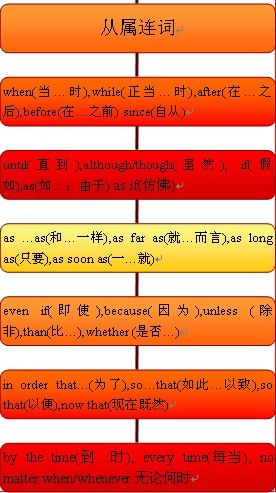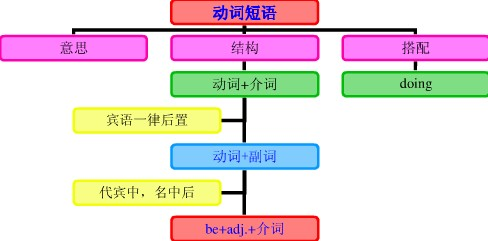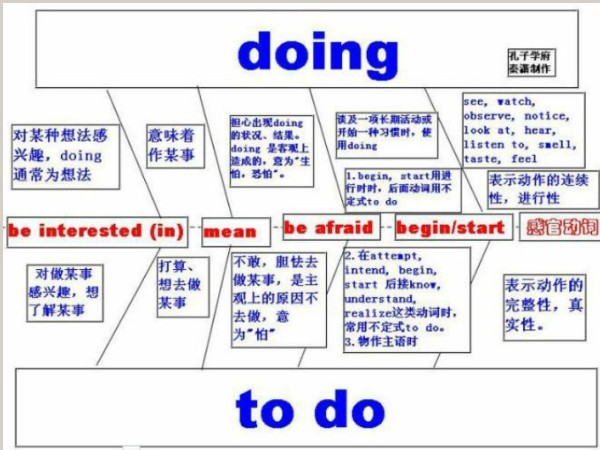本试题 “同义句转换。1. Her mother does not agree with her friendship with John.Her mother does not ____ ____ her friendship with John.2. The concert which ...” 主要考查您对可数名词及其单复数
从属连词
动词短语
动名词
过去分词
等考点的理解。关于这些考点您可以点击下面的选项卡查看详细档案。
- 可数名词及其单复数
- 从属连词
- 动词短语
- 动名词
- 过去分词
可数名词:
是指能以数目来计算,可以分成个体的人或东西;因此它有复数形式,当它的复数形式在句子中作主语时,句子的谓语也应用复数形式。
可数名词复数的规则变化:
| 情况 | 构成方法 | 读音 | 例词 |
| 一般情况 | 加 –s | 1.清辅音后读/s/; 2.浊辅音和元音后读/z/; |
map-maps bag-bags car-cars |
| 以s,sh,ch,x等结尾的词 | 加 -es | 读 /iz/ | bus-buses watch-watches |
| 以ce,se,ze,(d)ge等结尾 的词 |
加 -s | 读 /iz/ | license-licenses |
| 以辅音字母+y结尾的词 | 变y 为i再加es | 读 /z/ | baby-babies |
1)以y 结尾的专有名词,或元音字母+y结尾的名词变复数时,直接加s变复数:
如:two Marys the Henrys monkey---monkeys holiday---holidays
比较:层楼:storey---storeys story---stories
2)以o 结尾的名词,变复数时:
a. 加s,如: photo---photos piano---pianos
b. 加es,如:potato--potatoes tomato--tomatoes
c. 均可,如:zero---zeros / zeroes
3)以f或fe 结尾的名词变复数时:
a. 加s,如: belief---beliefs roof---roofs safe---safes gulf---gulfs;
b. 去f, fe 加ves,如:half---halves knife---knives leaf---leaves wolf---wolves wife---wives life---lives thief---thieves;
c. 均可,如:handkerchief: handkerchiefs / handkerchieves
可数名词复数的不规则变化:
1)child---children foot---feet tooth---teeth mouse---mice man---men woman---women
注意:与 man 和 woman构成的合成词,其复数形式也是 -men 和-women。
如:an Englishman,two Englishmen. 但German不是合成词,故复数形式为Germans;Bowman是姓,其复数是the Bowmans。
2)单复同形 如:
deer,sheep,fish,Chinese,Japanese
li,jin,yuan,two li,three mu,four jin
但除人民币元、角、分外,美元、英镑、法郎等都有复数形式。如:
a dollar, two dollars; a meter, two meters
3)集体名词,以单数形式出现,但实为复数。
如:staff people police cattle 等本身就是复数,不能说a staff a people,a police,a cattle,
但可以说a person,a policeman,a head of cattle, the English,the British,the French,the Chinese,the
Japanese, the Swiss 等名词,表示国民总称时,作复数用。
如:The Chinese are industries and brave. 中国人民是勤劳勇敢的。
4)以s 结尾,仍为单数的名词,如:
a. maths,politics,physics等学科名词,为不可数名词,是单数。
b. news 是不可数名词。
c. the United States,the United Nations 应视为单数。
The United Nations was organized in 1945. 联合国是1945年组建起来的。
d. 以复数形式出现的书名,剧名,报纸,杂志名,也可视为单数。
"The Arabian Nights" is a very interesting story-book.
<<一千零一夜>>是一本非常有趣的故事书。
5) 表示由两部分构成的东西,如:glasses (眼镜) trousers, clothes ;
若表达具体数目,要借助数量词 pair(对,双); suit(套); a pair of glasses; two pairs of trousers
6)另外还有一些名词,其复数形式有时可表示特别意思,如:goods货物,waters水域,fishes(各种)鱼
复合名词的复数形式:
名词作定语名词作定语一般用单数,但也有以下例外。
1)用复数作定语。
如:sports meeting 运动会
students reading-room 学生阅览室
talks table 谈判桌
the foreign languages department 外语系
2)man, woman, gentleman等作定语时,其单复数以所修饰的名词的单复数而定。
如:men workers
women teachers
gentlemen officials
3)有些原有s结尾的名词,作定语时,s保留。
如:goods train (货车)
arms produce 武器生产
customs papers 海关文件
clothes brush衣刷
4)数词+名词作定语时,这个名词一般保留单数形式。
如:two-dozen eggs 两打/(二十四个鸡蛋)
a ten-mile walk 十里路
two-hundred trees 两百棵树
a five-year plan 一个五年计划
可数名词单复数知识体系:

不同国籍人的单复数:
国籍
总称(谓语用复数)
单数
复数
中国人
the Chinese
a Chinese
two Chinese
瑞士人
the Swiss
a Swiss
two Swiss
澳大利亚人
the Australians
an Australian
two Australians
俄国人
the Russians
a Russian
two Russians
意大利人
the Italians
an Italian
two Italians
希腊人
the Greek
a Greek
two Greeks
法国人
the French
a Frenchman
two Frenchmen
日本人
the Japanese
a Japanese
two Japanese
美国人
the Americans
an American
two Americans
印度人
the Indians
an Indian
two Indians
加拿大人
the Canadians
a Canadian
two Canadians
德国人
the Germans
a German
two Germans
英国人
the English
an Englishman
two Englishmen
瑞典人
the Swedish
a Swede
two Swedes
从属连词的概念:
连词用于引导从句以形成句子的一部分或修饰句子的构成要素的叫作从属连词。
英语从属连词用法分类详解:
1、引导时间状语从句的从属连词:
(1)表示“当…时候”或“每当”的时间连词。主要的when, while, as, whenever:
如:He jumped up when the phone rang. 电话铃响时他吓了一跳。
We listened while the teacher read. 老师朗读时我们听着。
The phone rang just as I was leaving. 我正要离开,电话铃就响了起来。
(2)表示“在…之前(或之后)”的时间连词。主要的有before, after:
如:Turn the lights off before you leave. 离开前请关灯。
He started the job soon after he left the university. 他大学毕业后就开始做这份工作。
(3)表示“自从”或“直到”的时间连词。主要的有since, until, till:
如:He has lived here since he got married. 他结婚后就一直住在这儿。
Most men worked until[till] they're 65. 大多数男人工作到65岁。
(4)表示“一…就”的时间连词。主要的有as soon as, the moment, the minute, the second, the instant, immediately, directly, instantly, once, no sooner…than, hardly…when等:
如:Tell him the news as soon as you see him. 你一见到他就把这消息告诉他。
I recognized her the moment(that) I saw her. 我一看到她就认出她来了。
I want to see him the minute(that) he arrives. 他一到来我就要见他。
I went home directly I had finished work. 我一干完活就回家了。
Once he arrives, we can start. 他一来我们就可以开始。
(5)表示“上次”、“下次”、“每次”等的时间连词。主要的有every time(每次),each time(每次),(the) next time(下次),any time(随时),(the) last time(上次),the first time(第一次):
如:Last time I saw him, he looked ill. 上次我见到他的时候,他好像有病。
Next time you're in London come and visit us. 你下次来伦敦过来探望我们。
Do look me up next time you're in London. 你下次到伦敦来,一定来找我。
Every time I call on him, he is out. 我每次去访问他,他都不在。
You can call me any time you want to. 你随时都可以给我打电话。
【注】every time,each time,any time前不用冠词,(the)next time, (the)last time中的冠词可以省略,而the first time中的冠词通常不能省略。
2、引导条件状语从句的从属连词:
这类连词主要有if, unless, as[so] long as, incase等:
如:If anyone calls tell them I'm not at home. 要是有人打电话来,就说我不在家。
You will fail unless you work hard. 你若不努力就会失败。
As[So] long as you need me, I'll stay. 只要你需要我,我就留下。
In case I forget, please remind me about it. 万一我忘记,请提醒我一下。
【注】在条件状语从句中,通常要用一般现在时表示将来意义,而不能直接使用将来时态。不过,有时表示条件的if之后可能用will,但那不是将来时态,而是表示意愿或委婉的请求(will为情态动词):
如:If you will wait a moment, I'll fetch the money. 请等一下,我就去拿钱。
3、引导目的状语从句的从属连词:
主要有in order that, so that, in case, for fear等:
如:We used the computer in order that we might save time. 我们使用计算机是为了节约时间。
Speak clearly so that they may understand you. 说清楚,以便让他们能明白你的意思。
Be quiet in case you should wake the baby. 安静些,免得把婴儿吵醒。
He is working hard for fear he should fail. 他努力工作以免会失败。
4、引导结果状语从句的从属连词:
主要的有so that, so…that, such…that等:
如:We're all here now, so that the meeting can begin at last. 我们现在都到齐了,终于能开会了。
It's so difficult a question that none of us can answer it. 那是一个很难的问题,我们没有一个人能回答。
He shut the window with such force that the glass broke. 他关窗户用力很大,结果玻璃震破了。
【注】so that中的that在口语中通常可以省略。
5、引导原因状语从句的从属连词:
主要的有because, as, since, seeing(that), now(that), considering(that)等:
如:He couldn't got to school because he had a cold. 他因患感冒而未能去上学。
Since everybody is here, let's begin our discussion. 大家都到了,我们就开始吧。
Seeing that it is 8o'clock, we'll wait no longer. 由于时间已到8点,我们将不再等了。
Now that you are here, you'd better stay. 你既然来了,最好还是留下吧。
6、引导让步状语从句的从属连词:
主要有although, though, eventhough, even if, while, however, whatever, whoever, whenever, wherever等:
如:Although[Though] he is poor, he is well contented. 他虽穷却能知足常乐。
Though[Even though] it's hard work, I enjoy it. 尽管是苦活,但我乐意干。
Even if you don't like wine, try a glass of this. 即使你不喜欢喝酒,也尝尝这杯吧。
7、引导方式状语从句的从属连词:
主要有as, like, as if, as though, the way等:
如:Do it as[like] he does. 像他那样做。
He behaved as if nothing had happened. 他装作若无其事的样子。
They treat me as though I were a stranger. 他们待我如陌生人。
Nobody else loves you the way(=as) I do.没有人像我这样爱你。
8、引导地点状语从句的从属连词:
主要有where, wherever, everywhere等:
如:There were lots of parks where I lived. 我住的地方有许多公园。
Sit wherever you like. 你想坐在那儿就坐在那儿。
Everywhere they went, they were warmly welcomed. 他们每到一个地方都受到热烈欢迎。
9、引导比较状语从句的从属连词:
主要有than和as…as:
如:It's easier than I thought. 这比我想像的要容易。
They are as often wrong as they are right. 他们错对各半。
10、引导名词性从句的从属连词:
主要有that, if, whether:
如:It is clear enough what he meant. 他是什么意思很清楚。
Your greatest fault is that you are careless. 你最大的缺点是粗心大意。
Whether it will do us harm remains to be seen.是否对我们有害还要看一看。
She didn't say if he was still alive. 她没说他是否还活着。
从属连词知识体系:

用作从属连词的六类名词结构:
英语中有些名词结构可用作从属连词,用以引导状语从句,且主要是时间状语从句。这类结构归纳起来有以下六类:
一、the+瞬间名词:
其中的瞬间名词主要包括moment, minute, instant, second等,其意为“一……就……”,相当于as soon as。
如:The minute he saw her he fell in love. 他对她一见倾心。
Telephone me the moment(that) you get the results. 你一有结果,马上给我打电话。
I was so tired that I fell asleep the instant I closed my eyes. 我很累,一合上眼就睡着了。
Sheputdownthereceiverthesecondsherecognizedmyvoice.她一听出是我的声音,马上就放下电话听筒。
注:其中的瞬间名词后可接that,也可省略。另外,有的个别副词(如directly/immediately等)也可表示类似意思。
如: Immediately the meal was over,he switchedon the radio.饭一吃完他就把收音机打开。
二、the+季节名词:
其中的季节名词包括spring,summer,autumn,winter,其意为“在……的那年春天、夏天、秋天、冬天。
如:His wife left him thes pring he went abroad.在他出国的那年春天,他的妻子离开了他。
He sold his house and went to the souththe summer he lost hisjob.在他失业的那年夏天,他卖掉房子去了南方。
He was sentto prison the winter his third daughter was born.在他第三个女儿出生的那年冬天,他被关进了监狱。
She got married the autumn she graduated from college.她大学毕业的那年秋天就结婚了。
三、the+时间名词:
其中的时间名词主要包括hour,day,night,week,month,season,year等,其意为“在……的时候、那天、那个晚上、那周、那个月、那个季节、那年”。
如: The hour he wa sin her office,he felt very sad.当他在她办公室的时候,他感到很伤心。
The day here turned home,his father was already dead.他回家的那一天,他的父亲已经死了。
The night I wenttoseeher,shehadleftforBeijingtoattendanimportantmeeting.就我去看她的那个晚上,她到北京去开一个重要的会议了。
Mr Smith didn't go to work the week his wife was ill.史密斯先生在他妻子生病的那个星期没去上班。
They ear helivedinthecountry,he learned alot.他在乡下呆的那一年,他学到了不少东西。
四、the+序数词+time
其中的序数词包括first,second,third,fourth等,其意为“当第几次……的时候”。
如: My girlfriend beat me at pokert he first time weplayed.我头一次和女朋友打扑克,她就把我赢了。
These cond time I saw her,she looked like an old woman.我第二次见到她时,她看上去像一个老太婆。
The third time I went there,I found all of them had left and the offices were all empty.我第三次去那儿时,我发现他们都离开了,所有的办公室都是空的。
注:
1.next,last也具有类似序数词的性质,因此也具有以上用法。
如: Nexttimeyoucomein,pleaseclosethedoor.下次你进来,请关门。
Thelasttimewetalkedhesaidheneededanothertwodays.上次我们谈话时他说他还需要两天。
2.thefirsttime,thesecondtime,thethirdtime等用作连词引导时间状语从句时,其前通常要有定冠词,而(the)nexttime,(the)lasttime引导状语从句时,其中的冠词可以省略,如下面这道上海高考题,其答案是C,不是A:
I though ther nice and honest______Imether.
A.first time B.fo rthe first time C.the first timeD.by the first time
五、不定代词+time
其中的不定代词主要包括each,every,any等。
如:Every time I ringher,the phone is engaged.我每次给她打电话,电话都占线。
Every time I see him he either wants to tell me his trouble or borrow some money.每次我见到他,他不是向我诉苦,就是要向我借钱。
He felt nervous each times he spoke to him.每次她和他讲话,他都感到紧张。
AnytimeyoucometoLondondolookmeup.你无论什么时候到伦敦来,一定要来看我。
注意:everytime,eachtime,anytime用作连词引导状语从句时其前习惯上不用冠词,它与the first time,these cond time,the third time等引导时间状语从句时其前必须要用定冠词不同。
六、其他名词结构
以上归纳的名词结构均用于引导时间状语从句,有些其他结构还可引导其他性质的状语从句,如the way可用于引导方式状语从句,表示“像……一样”。如:
The didn’t do it the way we do now.那时他们不像我们现在这样行事。
Joyce looked at me the way alotof girls did.乔伊丝像许多姑娘那样瞧着我。
注:这样用的theway与as用法相似。
如:Hold itin both hands,the way(=as)Mummy does.用两只手捧住,像妈妈那样。
动词短语的概念:
动词常和某些其他词类用在一起,构成固定词组,形成所谓短语动词(phrasalverb)。和动词一样,短语动词也可分为及物和不及物两种。短语动词可以作为一个整体看待,同一般动词一样使用。
动词短语的搭配类型:
1)动词+介词:这类短语动词用作及物动词,后面须跟宾语。
如:The small boy insisted on going with his parents. 那男孩坚持要跟父母一起去。
Do you often listen to broadcasts in English? 你常听英语广播吗?
Look at the children. Aren't they lovely? 看着这些孩子们。他们多么可爱呀!
We stand for self-reliance. 我们是主张自力更生的。
这一类的短语动词还有很多,如depend on(upon)(依靠),wait on(服侍),look for(寻找),deal with(对待),look after(照料),wait for(等待)等。
2)动词+副词:
这类短语动词有的用作及物动词,有的用作不及物动词。
如:I always get up as soon as the bell rings. 我总是一打铃就起床。(不及物)
Look out, there's a car coming! 当心,来汽车了!(不及物)
Have you handed in your exercises already? 你已经交练习了吗?(及物)
Please don't forget to put on your coat, it's cold outside. 请不要忘记穿外衣,外面很冷。(及物)
这一类的短语动词还有很多,及物如put out(扑灭),eat up(吃光),put down(放下);不及物如set off(出发),come up(走近),go on(继续)。
注:"动词+副词"这类短语动词和上面第一类"动词+介词"的不同之处在于:"动词+介词"用作及物动词,后面须跟宾语。"动词+副词"则有的及物,有的不及物;用作及物动词而宾语为人称代词或自身代词时,副词往往放在宾语之后。
如:Please wake me up at five tomorrow. 请在明天早上五点唤醒我。
If you have done your exercises, please hand them in. 如果你们练习做完了请交来。
She doesn't normally behave like that, she's putting it on. 她通常并不如此表现,她是装出来的。
注:这类短语动词有不少可兼作及物和不及物动词用。
如:He took off his hat when he entered the office. 他进办公室后脱下帽子。(及物)
The plane took off at seven sharp. 飞机在七点整起飞。(不及物)
Charlie rang up Neil to ask about the time of the meeting. 查理打电话给尼尔问开会的时间。(及物)
If you can't come, please ring up and let us know. 你如来不了,请来电话告诉我们一声。(不及物)
3)动词+副词+介词:
"动词+副词"之后有的可以再加一个介词,形成另一种短语动词。这类短语动词用作及物动词。
如:Do not give up hope. We must go on with the experiment 不要失望。我们必须继续试验。(go on with继续)
He came up to me. 他走到我跟前。(come up to走近)
这类短语动词还有:look down upon(看不起),do away with(去掉),put up with(忍受)等。
4)动词+名词+介词:
这类短语动词也是及物的。
如:He shook hands with all the guests at the banquet. 他在宴会上和宾客一一握手。
Young pioneers often come to the Children's Palace to take part in after school activities.少先队员经常到少年宫来参加课外活动。
Pay attention to the temperature of the stored rice. 注意仓库里的稻谷的温度。
Her job is taking care of the babies. 她的工作是照顾婴儿。
这一类短语动词还有:put an end to(结束),take notice of(注意),catch hold of(抓住),lose sight of(看不见),make use of(利用)等。
动词短语知识体系:

动名词概念:
动名词是一种兼有动词和名词特征的非限定动词。它可以支配宾语,也能被副词修饰,动名词有时态和语态的变化。
现在分词和动名词用法比较:
动词的-ing形式包括现在分词和动名词两种形式。他们的句法功能如下:
动词的-ing形式如果作句子的主语或者宾语时,应该是动名词形式;如果作补语或者状语时,应该是现在分词形式。那么作表语或者定语的动名词和现在分词又该怎样区分呢?
1、动名词与现在分词作表语时的比较:
(1)动名词作表语说明主语的内容,回答what的问题;现在分词作表语相当于形容词作表语,说明主语的性质、特征等,回答how的问题。
如:One of the best exercises is swimming. 游泳是最好的运动项目之一。
What pleases him most is bathing in the sea. 最使他高兴的事是在海中沐浴。
The situation both at home and abroad is very in-spiring. 国内外的形势都很鼓舞人心。
The color is pleasing to the eye. 颜色悦目。
(2)动名词作表语,表语和主语几乎处于同等地位,可以互换位置,其句意不变;现在分词作表语,表语和主语则不能互换位置。
如:Our work is serving the people.
(=Serving the people is our work.)我们的工作是为人民服务。
The news was disappointing. 那消息令人失望。
(3)作表语的现在分词前可以用very,quite,rather,greatly等副词修饰,而动名词则不可以。
如:What he said was very encouraging. 他的话很鼓舞人心。
Our goal is realizing the four modernizations in the near future. 我们的目标是在不久的将来实现四个现代化。
(4)现在分词与形容词一样可以和more,the most构成形容词的比较级和最高级,而动名词则不可以。
如:The story is the most fascinating. 那个故事最迷人。
(5)作表语用的现在分词除了和be连用以外,还可以和其它的系动词连用;而作表语的动名词则通常只能和be连用。
如:His speech seems inspiring.他的演讲似乎很鼓舞人心。
His interest is writing for the news papers. 他的爱好是给报社写文章。
(6)有些用作表语的现在分词已经形容词化了。常见的有:exciting,moving,inspiring,missing,interesting,disappointing等。
2、动名词与现在分词作定语时的比较:
(1)动名词作定语时,表示它所修饰的名词的性能和用途,和它所修饰的名词在逻辑上没有主谓关系;
现在分词作定语时,表示它所修饰的名词正在进行的动作,和它所修饰的名词在逻辑上有主谓关系,常可以扩展成一个定语从句。
如:a swimming girl=a girl who is swimming 一个在游泳的姑娘
a walking stick=a stick that is used for walking 一根拐杖
(2)现在分词作定语有时可以后置,而动名词则通常只能放在它所修饰的名词之前。
如:The girl wearing glasses is one of his students. 戴眼镜的那个女孩是他的一个学生。
I bought some reading materials. 我买了一些阅读材料。
动名词的用法:
1、作主语:
例如:Fighting broke out between the South and the North. 南方与北方开战了。
2、作宾语:
a. 有些动词可以用动名词作宾语。
例如:admit承认 appreciate感激 avoid避免 complete完成 consider认为 delay耽误 deny否认 detest讨厌 endure忍受 enjoy喜欢 escape逃脱 fancy想象 finish完成 imagine想象 mind介意 miss想念 postpone推迟 practice训练 recall回忆 resent讨厌 resume继续 resist抵抗 risk冒险 suggest建议 face面对 include包括 stand忍受 understand理解 forgive宽恕 keep继续
例如:Would you mind turning down your radio a little, please? 你把收音机音量调小一点,好吗?
The squirrel was lucky that it just missed being caught. 这松鼠幸运得很,刚逃避了被逮住的厄运。
b. 有些结构后面可以用动名词作宾语或其他成分。
例如:admit to prefer...to burst out keep on insist on count on set about put off be good at take up give up be successful in be used to lead to devote oneself to object to stick to no good no use be fond of look forward to be proud of be busy can't help be tired of be capable of be afraid of think of
3、作表语,对主语说明、解释:
例如:Her job is washing, cleaning and taking care of the children. 她的工作是洗刷、清扫和照顾孩子。
比较:She is washing, cleaning and taking care of the children.
4、作定语,一般表示所修饰名词事物的用途:
例如:a writing desk=a desk for writing 写字台
a swimming pool=a pool swimming 游泳池
有些动名词作定语,与所修饰的名词关系比较复杂。
例如:boiling point=a temperature point at which something begins to boil 沸点
a walking tractor=a tractor which a driver can operate while he or she is walking behind it 手扶拖拉机
动名词知识体系:

动名词与不定式用法对比:

过去分词的概念:
过去分词一般表示完成和被动的动作,只有一种形式。即:动词原形加-ed构成。
如:fallen leaves 落叶
boiled water 开水
I heard the door closed. 我听见门被关上了。
过去分词与现在分词被动式的区别:
两者均可表示被动,其区别主要在于它们所表示的时间概念不同,但有时它们也可表示相同的意思。
如:Written in haste, the book has many mistakes. 这书因写得仓促,所以错误不少。
Being written in haste, the book has many mistakes. 这书因写得仓促,所以错误不少。
Having been written in haste, the book has many mistakes. 这书因写得仓促,所以错误不少。
有时虽然所表示的时间概念相同,但有细微区别:
如:Having been show the lab, we left. 被领着看了实验室后,我们就离开了。
过去分词的句法功能:
1、作定语:
如:I don't like the book written by Martin.
Our class went on an organized trip last Monday. 上周一我们班开展了一次有组织的旅行。
注意:当过去分词是单词时,一般用于名词前,如果是过去分词短语,就放在名词的后面。过去分词做定语相当于一个被动语态的定语从句。
2、过去分词作表语:
如:They were very excited at the news. 听到这个消息,他们非常激动。
The window is broken. 窗户破了。
They were frightened at the sad sight. 他们对眼前悲惨的景象感到很害怕。
注意:be+过去分词,如果表示状态是系表结构,如果表示被动的动作是被动语态。
区别:The window is broken.(系表)
The window was broken by the boy.(被动)
有些过去分词是不及物动词构成的,不表示被动,只表示完成。
如:boiled water(开水) fallen leaves(落叶) newly arrived goods(新到的货) the risen sun(升起的太阳) the changed world(变了的世界)
这类过去分词有:gone, come, fallen, risen, changed, arrived, returned, passed等。
3、过去分词作宾语补足语:
如:I heard the song sung several times last week. 上周我听见这首歌被唱了好几次。
有时过去分词做with短语中的宾语补足语:
如:With the work done, they went out to play. 工作做完了,他们出去玩去了。
4、过去分词作状语:
如:Praised by the neighbours, he became the pride of his parents. 受到邻居们的表扬,他成为父母的骄傲。(表示原因)
Onceseen, it can never be forgotten. 一旦它被看见,人们就忘不了。(表示时间)
Given more time, I'll be able to do it better. 如果给予更多的时间,我能做得更好。(表示条件)
Though told of the danger, he still risked his life to save the boy. 虽然被告之危险,他仍然冒生命危险去救那个孩子。(表示让步)
Filled with hopes and fears, he entered the cave. 心中充满了希望与恐惧,他走进山洞。
5、过去分词与逻辑主语构成独立主格:
如:All books returned at the end of the term, the library assistant was satisfied. 所有的书期末时都还了,图书管理员很高兴。
The field ploughed, he began to spread seed. 地耕好了,他开始撒种子。
现在分词与过去分词的区别:
1、分词作表语:
分词做表语有两种情况,一种是现在分词做表语,一种是过去分词做表语,这两者区别是考试中经常考到的地方。一般来说,表示心理状态的动词如excite,interest等都是及物动词,汉语意思不是“激动”,“高兴”,而是“使激动”、“使高兴”,因而现在分词应该是“令人激动的”、“令人高兴的”,过去分词则是“感到激动的”和“感到高兴的”。所以,凡表示“令人……的”都是-ing形式,凡是表示“感到……”都用-ed形式。换句话说,若人对……感兴趣,就是somebody is in terestedi n...,若人/物本身有兴趣时,就是说sb./sth. is interesting。这类词常见的有:
interesting 使人感到高兴—interested感到高兴的
exciting令人激动的—excited感到激动的
delighting令人高兴的—delighted感到高兴的
disappointing令人失望的—disappointed感到失望的
encouraging令人鼓舞的—encouraged感到鼓舞的
pleasing令人愉快的—pleased感到愉快的
puzzling令人费解的—puzzled感到费解的
satisfying令人满意的—satisfied感到满意的
surprising令人惊异的—surprised感到惊异的
worrying令人担心的—worried感到担心的
如:Travelling is interesting but tiring. 旅行是有趣的,但是使人疲劳。
The pupils will get confused if they are made to learn too much. 如果要学生学得太多,他们会感到糊涂的。
The game is exciting. (现在分词作表语)
We were excited at the news. (过去分词作表语)
2、分词作定语:
分词作定语时有下面几个特点:
1)现在分词表示主动意义,过去分词一般表示被动含意。
2)现在分词表示正在进行,过去分词表示状态或做完(完成)的事。
如:He rushed into the burning house. 他冲进了正在燃烧着的房子。
The child standing over there is my brother. 站在那儿的男孩子是我弟弟。
The room facing south is our classroom. 朝南的房间是我们的教室。
He is an advanced teacher. 他是个先进教师。
3)下列不及物动词也以过去分词形式做定语或表语,但不具有被动意义,这点要注意:
departed, elapsed, faded, fallen, gone, frown-up, retired, returned, risen, set, vanished, much-traveled, newly-arrived, recently-come
3、分词作状语:
现在分词做状语与过去分词做状语的最主要区别在于两者与所修饰的主语的主动与被动关系的区别。
1)现在分词作状语时,现在分词的动作就是句子主语的动作,它们之间的关系是主动关系。
如:He went out shutting the door behind him. 他出去后将门随手关上。
Not knowing what to do, he went to his parents for help. 由于不知如何办是好,他去找父母帮忙。
Smiling, they came in.
2)过去分词作状语时,过去分词表示的动作是句子主语承受的动作,它们之间的关系是被动关系。
如:Cleaned, the room looks nice.
Given more attention, the trees could have grown better. 如果对这些树多关心一些,它们本来会长得更好。
Faced with difficulties, we must try to overcome them. 在遇到困难的时候,我们必须设法克服。
与“同义句转换。1. Her mother does not agree with her friends...”考查相似的试题有:
- Experts are trying to work out a plan to deal with the problems caused by global warming ______ it is too late.A.whe...
- It suddenly occurred to him _____ he had left his keys in the office.A.whetherB.whereC.whichD.that
- A good speaker is supposed to manage to ______ the listeners what he means.[ ]A. make sense toB. get across toC. appe...
- She has many faults, but we’re all very _____________ her.A.hateB.fond ofC.enjoyD.like
- When I said that some people are stupid I was not _______ you.A.talking toB.referring toC.turning toD.listening to
- 短文改错。此题要求在答题卡上改正所给短文中的错误,对标有题号的每一行作出判断:如有错误(每行只有一个错误),则按下列...
- You can’t have lost the keys.___ all your pockets again.A.Go downB.Go againstC.Go throughD.Go across
- The young doctor is determined to devote all his life to ________ the cause of cancer.A.studyingB.studiedC.studyD...
- ____________________ to the party, Joan was greatly hurt.A.Having not been invited.B.Having not invitedC.Not havin...
- — Can I help you?— Yes, I’m looking for a pen.— We have some new arrivals for you to ______A.selectB.chooseC.pick ...